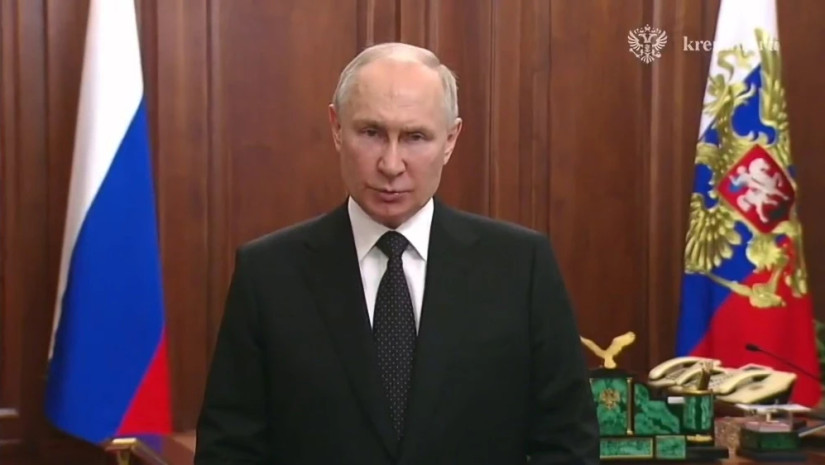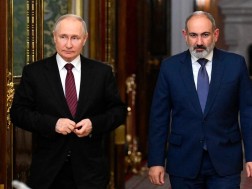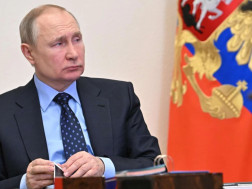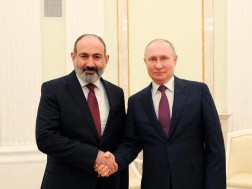On June 24, Moscow was put under a state of emergency for the first time since Russia launched a full-scale invasion of Ukraine. And while the Ukrainian army has demonstrated the ability to strike into Russian territory, it was not Kyiv’s troops that threatened the Russian capital – it was an internal Russian force.
Yevgeny Prigozhin, a former ally of Russian President Vladimir Putin and the head of the Wagner private military group, withdrew his troops from the front line in Ukraine and led them across the border into Russia, launching what he called a “march of justice” to Moscow. He declared that, with the help of his 25,000-strong militia, he wanted to oust the leadership of the defence ministry, which he has accused of large-scale corruption and being responsible for various setbacks in the war.
This defiance followed the decision by the Russian defence ministry to force all mercenaries to take up official contracts with the army, which would have put an end to Prigozhin’s successful mercenary project. Russia’s Federal Security Service (FSB) also opened a criminal investigation against him and called for his arrest.
Within hours of Prigozhin announcing that he had “taken over” Rostov-on-Don, a southern Russian city across the border with Ukraine, and sent a convoy towards Moscow, Putin declared in a televised speech that his actions amounted to “armed mutiny” and that “big ambitions and personal interests led to treason”. After Belarusian President Alexander Lukashenko intervened, mediating between Moscow and the mercenary commander, the latter decided to withdraw his forces to avoid “shedding Russian blood”.
These events marked a significant escalation in the longstanding feud between Prigozhin and the Russian military top brass over resources and decision-making in the Russo-Ukrainian war. They also constituted the most severe domestic crisis Putin has seen in recent years.
And he has only himself to blame for it: Prigozhin is his creation. He established the Wagner mercenary group to serve in the Kremlin’s various foreign adventures, part of its geopolitical expansionist agenda in the Middle East and Africa. It also played a key role in the Russian full-scale invasion of Ukraine last year.
Putin has not only empowered Prigozhin and others like him that have challenged official state institutions, but has also fed their “big ambitions” by refusing to name a clear successor for the Russian presidency.
This power void has motivated figures like Prigozhin to step forward and stake their claims. The resulting dynamics of power and ambition are stirring unrest in the country which can have serious consequences for Putin’s regime, as the events on Saturday demonstrated.
The war in Ukraine has only exacerbated the situation as it has given space for these political actors to build their public reputation and popularity. Initially, Prigozhin was particularly successful in attracting the support of the “war party” – those in Russia who not only cheered the invasion of Ukraine but also pushed for more decisive military action.
His rhetoric mirrored their resentment of the Russian defence ministry and the army leadership, mirroring their criticism of these institutions’ flaws and inefficiencies. The Kremlin allowed these verbal attacks to continue, perhaps seeing their utility in diverting public blame for any setbacks on the battlefield from Putin, the commander-in-chief, to the army’s top brass.
Prigozhin took advantage of the space he was given and over the past year, he broadened his appeal, drawing in a wider section of Russian society. This fuelled public speculation about his political ambitions.
In the past few months, he became more active, conducting meetings with civilians, fighters and relatives of those killed in the war; he visited large Russian cities, commented on political developments, and criticised the state authorities.
His actions suggest that he was not merely trying to put in his bid for the unofficial position of Putin’s successor; rather he was striving to preserve his own life by building a high-level profile and expanding his popularity among the general public. Likely, he was hoping that those who resented his empowerment and wanted to get rid of him would fear the public outrage any attempt on his life would generate.
The silence of the Kremlin over his public spat with the defence ministry emboldened Prigozhin to the point where he took it upon himself to punish military officers who he perceived as trying to sabotage him. Earlier this month, Wagner fighters captured the 72nd Motorized Rifle Brigade’s commander, Lieutenant Colonel Roman Venevitin, and later released an interrogation video of him in which he appeared to admit that he ordered his troops to fire on a Wagner convoy.
Eventually, Prigozhin seems to have overstepped, as the Kremlin decided to side with the defence ministry. Putin himself stated publicly that he backed the order issued for all mercenaries to sign contracts with the ministry. This display of presidential disfavour likely motivated Prigozhin’s decision to escalate by directly threatening Moscow.
The events of the past two days have certainly caused a lot of alarm in the Kremlin. First, Putin faced a high-profile figure who controls his own militia and openly rebelled against him. Second, the mercenary forces marched with ease into Rostov-on-Don and then reached within a few hundred kilometres of the Russian capital, demonstrating just how incapable the president is of securing Russian territory.
This weakness was also revealed in late May and early June when a combat group consisting of the “Russian Volunteer Corps” and “Freedom of Russia Legion”, two Russian volunteer factions, started launching attacks on Russia’s Belgorod region. They even managed to occupy and hold territory in an attempt to create a demilitarised zone.
This brazen act sparked outrage among many Russian politicians and media experts, who clamoured for immediate retaliation. Yet Putin remained conspicuously silent on the matter. This uncharacteristic reticence left even his most loyal supporters puzzled; some voiced their confusion on state TV, questioning the lack of a clear plan and echoing the call for retribution.
Before his recent escalation, Prigozhin proposed sending his mercenaries to secure Belgorod, but he was turned down. Instead, another political actor with a military force loyal to him – Chechen leader Ramzan Kadyrov – stepped in.
After a June 12 meeting between Adam Delimkhanov, a member of the state Duma who is close to Kadyrov, Vyacheslav Gladkov, the governor of the Belgorod Region, and representatives from the defence ministry and the Federal Guard Service, it was decided that Kadyrov’s Akhmat forces would be tasked with defending the region.
That Putin cannot rely on the army to secure Russian territory does not bode well for the internal stability of the country. Putting territory outside of Chechnya under the control of Kadyrov’s forces may stir local resentment and is certainly not a reasonable solution given what just happened with another private militia.
Prigozhin’s rebellion, though brief, will likely have a lasting impact on Putin’s regime. For one, it has shattered the illusion of invincibility surrounding his rule and publicly humiliated him.
This is likely to provoke a strong response from Putin, a former KGB agent and FSB chief, whose opponents have often faced assassination attempts – many of them successful. After enduring such a significant humiliation, it seems unlikely that Putin would opt to imprison Prigozhin. There is a considerable risk that he could be liberated from prison, given his newfound popularity among Russians and his authority among prisoners. Therefore, Putin will likely “play it safe” and have Prigozhin eliminated.
But that would not change the fact that the rebellion demonstrated Putin’s weakness to all – the Russian people, the Russian elites, and foreign allies and adversaries. This may embolden others within the elite to challenge his leadership or the political status quo. Kadyrov has so far shown his unreserved loyalty to the Russian president, but there is no guarantee that he may not use his forces to extract concessions from him in the future.
Importantly, this upheaval may change the way China, the Kremlin’s most important ally right now, sees Putin. A perception of weakness by Beijing may make Chinese policy towards Russia far less accommodating and far more assertive in the near future.
Indeed, Prigozhin, Putin’s Frankenstein monster, has managed to do so much damage in just two days that his creator may struggle for years to fix it.
Maksym Skrypchenko is president of the Kyiv-based Transatlantic Dialogue Center. The OP-ED was first published at ALJAZEERA
















